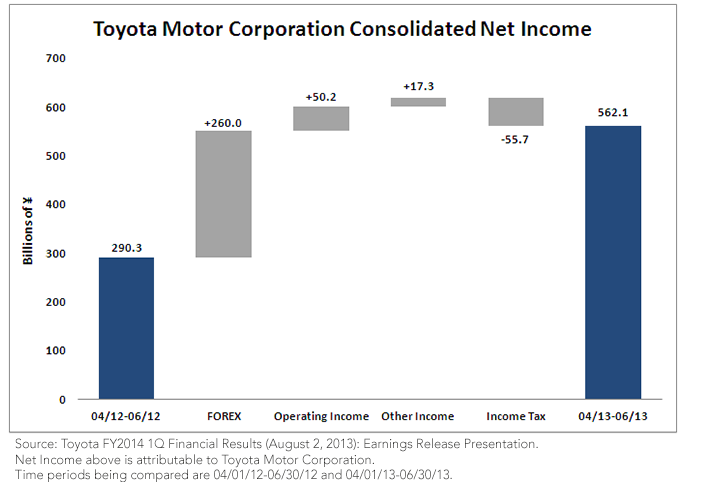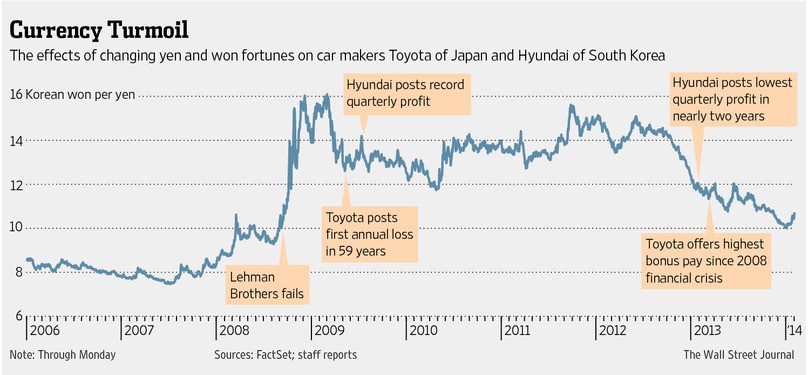Japan Quarterly Earnings Weaker Yen Helping Exporters
Post on: 24 Июнь, 2015 No Comment

Japan Quarterly Earnings: Weaker Yen Helps Exporters by Tripp Zimmerman, Research Analyst, The WisdomTree Blog
Japanese stocks have continued to perform well as a result of “Abenomics ” policies, which are all aimed at one thing: promoting economic growth in Japan. The unprecedented monetary easing by the Bank of Japan—which has become the most aggressive central bank in the world—has improved sentiment in Japan, caused the yen to weaken and strengthened the markets.
Weaker Yen Has Benefited Exporters Earnings
Thus far, the monetary stimulus has coincided with a weaker yen. A weaker yen ultimately helps large multinational companies that sell products overseas. Products of these companies generally become more attractive to foreign buyers when the yen weakens. Also, overseas sales converted back to a weak yen translate to more yen revenue, ultimately adding to the bottom line. The chart below illustrates the positive effect a weaker yen has had on Toyotas operating income.
Toyota Motor Corporation Operating Income
• Yen Depreciation Dramatically Contributes to Earnings – The depreciation of the yen accounted for 215 billion yen of the 258.8 billion yen growth in income compared to the same reporting period last year. It is important to realize that Toyotas gain from the yen depreciation represents more than 80% of the total growth in income for the period.
• Further Yen Depreciation Can Add to Future Profits – If the yen continues to depreciate, it could potentially continue to add to Toyotas bottom line. Toyota has forecast to sell 9.0 million vehicles in its 2015 fiscal year, and 6.85 million (approximately 75%) of those are expected to be sold outside Japan. 1 The continued overseas sales converted back to a potentially weaker yen translate to even more yen revenue. Commenting on the forecasts for Toyotas 2015 fiscal year, Takuo Sasaki, chief director of accounting, said, “While we expect a reduction in vehicle sales, we are raising our operating income forecast by 200 billion yen to 2.7 trillion yen, factoring in the change in our foreign exchange rate assumption and the progress in our profit improvement activities, such as cost reduction efforts.”
• Toyotas Stock Performance Also Strong – Market participants have recognized the benefit a weaker yen has had on Toyotas bottom line. Toyotas total return was approximately 21.2%, while the broader Tokyo Stock Price Index (TOPIX) for Japan was up 10.3%, over the 2014 calendar year. The yen was down 12.1% during this same period. 2
Other Automakers Also Benefit from a Weaker Yen
Other large Japanese automakers have benefited from a weakening yen due to their export-oriented business models. The list below shows two major automakers and the amount of reported income during their most recent earnings periods compared to the same periods of the preceding year 3 .
• Honda Motor Co Ltd (ADR) (NYSE:HMC ) (TYO:7267 ) – Reported operating income of 539.7 billion yen, down 45.2 billion yen from the year before, but had a gain of 43.1 billion yen from currency effects 4
• Mazda – Reported operating profit of 152.0 billion yen, up 27.4 billion yen from the year before, with a gain of 18.9 billion yen from currency effects 5
U.S. Automakers Facing Headwinds from a Stronger Dollar
Previously we discussed how some U.S. multinationals are being negatively impacted from a strengthening dollar. The strengthening dollar also had a negative impact on a few U.S. automobile companies during the 2014 calendar year. These U.S. companies directly compete with Toyota and other Japanese automotive companies across the globe, and as the dollar strengthens against the yen, the U.S. companies become less competitive.
• General Motors Company (NYSE:GM ) – Reported earnings before interest and taxes (EBIT) of $6.5 billion, down $2.1 billion from the year before, with a loss of $1.3 billion attributed to foreign exchange 6
• Ford Motor Company (NYSE:F ) – Reported pretax income of $4.5 billion for its automotive sector, down $2.4 billion from the year before, with a loss of $1.1 billion attributed to foreign exchange 7
Hedge Your Currency Exposure
If the yen continues to weaken, Japanese exporters should continue to benefit. On the other hand, a weakening yen is not good for U.S. investors in Japanese equities—unless they hedge the currency. Currency-hedged strategies allow investors to focus on Japanese equities without the worry over currency declines.
For current holdings of WisdomTree ETFs, please visit wisdomtree.com .
1 Source: Toyota FY2015 3Q Financial Results, 2/4/15.
2 Source: Bloomberg.
3 Period is the first nine months of their 2015 fiscal years compared to the first nine months of their 2014 fiscal years.

4 Source: Honda FY2015 3rd Quarter Financial Results, 1/30/15.
5 Source: Mazda FY2015 Third-Quarter Financial Results, 2/4/15.
6 Source: General Motors Q4 2014 Financial Results, 2/4/15.
7 Source: Ford Q4 2014 Earnings Release, 1/29/15.
Important Risks Related to this Article
This information should not be considered a recommendation to buy, sell or hold the individual stocks referenced above.
Click here to obtain a WisdomTree ETF prospectus which contains investment objectives, risks, charges, expenses, and other information; read and consider carefully before investing.
There are risks involved with investing, including possible loss of principal. Foreign investing involves currency, political and economic risk. Funds focusing on a single country, sector and/or funds that emphasize investments in smaller companies may experience greater price volatility. Investments in emerging markets, currency, fixed income and alternative investments include additional risks. Please see prospectus for discussion of risks.
Past performance is not indicative of future results. This material contains the opinions of the author, which are subject to change, and should not to be considered or interpreted as a recommendation to participate in any particular trading strategy, or deemed to be an offer or sale of any investment product and it should not be relied on as such. There is no guarantee that any strategies discussed will work under all market conditions. This material represents an assessment of the market environment at a specific time and is not intended to be a forecast of future events or a guarantee of future results. This material should not be relied upon as research or investment advice regarding any security in particular. The user of this information assumes the entire risk of any use made of the information provided herein. Neither WisdomTree nor its affiliates, nor Foreside Fund Services, LLC, or its affiliates provide tax or legal advice. Investors seeking tax or legal advice should consult their tax or legal advisor. Unless expressly stated otherwise the opinions, interpretations or findings expressed herein do not necessarily represent the views of WisdomTree or any of its affiliates.
Jonathan Steinberg, Luciano Siracusano III, Jeremy Schwartz, David Abner, Rick Harper, Sean Kelly, Christopher Gannatti, Bradley Krom, Tripp Zimmerman, Eswarie Subrahmanyam S. Balan, Zachary Hascoe, and Anita Rausch are registered representatives of Foreside Fund Services, LLC.
WisdomTree Funds are distributed by Foreside Fund Services, LLC.
You cannot invest directly in an index.














